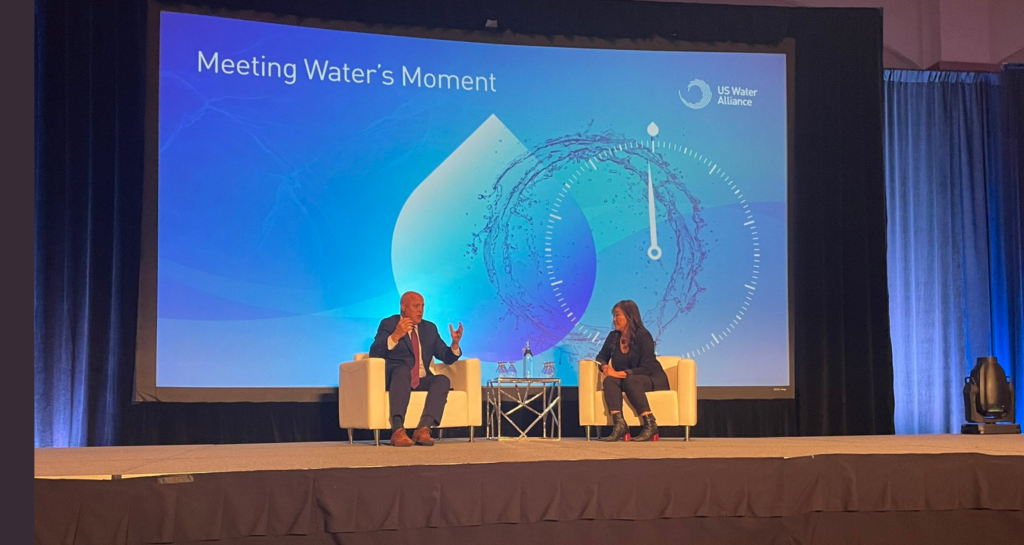BY KERRY HASTINGS, The Funders Network
I had the wonderful opportunity this fall of attending the US Water Alliance’s One Water Summit in Milwaukee, Wisc., joined by five of our Urban Water Funders Steering Committee members: Alex Paxton of the Water Foundation; Dana Okano of the Hawaii Community Foundation; Yeou-Rong Jih of the Kresge Foundation; Emily Warren of the Mitchell Foundation, and Maggie Rwakazina of Spring Point Partners. It was a rich time of deepening relationships, learning together, and preparing for the years ahead of historic public investment in water infrastructure.
What stood out initially was the cross-sectoral nature of the conference. To be in a room mixed with utility leaders, other municipal leadership, community advocates, NGOs and funders led to rich and well-rounded discussion. In a moment where billions of dollars will be flowing through public agencies, community voice must be centered, and the conference allowed for fruitful discussion between the various stakeholders that will be involved in making this moment count.
While the amount of federal dollars is tremendous, there are gaps and blind spots that public spending can’t or won’t address. Here are my reflections from the conference on some of the most important roles for philanthropy to play in supporting equitable implementation:
- Frontline communities must guide the way. Federal water investments will certainly get to communities who are already well-resourced. The challenge is getting them to communities who need it most yet are least equipped to apply (such as small and/or rural communities) or those whose neighborhoods are less prioritized (such as low-wealth neighborhoods within major cities). Ensuring that community-led organizations have the resources they need to understand and advocate within the system ensures that they will see projects come to their communities that bring benefit and not harm. They can shape project proposals, apply for funding, advocate for more equitable criteria to distribute the monies, and hold elected officials accountable. In addition, their involvement is critical to think through how to avoid unintended consequences that investments often bring to low-resourced communities, such as gentrification and displacement.
- Supporting collaboration and stakeholder alignment. This is not an either/or moment, it is a both/and one. Funders cannot invest in just one stakeholder or strategy while ignoring the others. There are several players that will be involved in ensuring equitable implementation: states and municipalities, utilities, organizers and advocates, funders, technical assistance providers and engineers. For the most effective outcomes, communities need a healthy ecosystem where stakeholders can communicate, align and build consensus when possible. Philanthropy can play a role in helping to build this table and paying particular attention to centering community voices and ensuring that lived experience within a community is as highly valued as technical and engineering experience. While not every stakeholder can or should be funded by philanthropy’s limited dollars, investing in bringing folks together will prove valuable.
- The workforce conundrum is front and center. The “silver tsunami” of the water workforce is not a new challenge but has been exacerbated by COVID-related retirements. On top of that, the influx of billions of dollars means that new staff are needed: to apply for the money, manage and distribute the money, build the projects and maintain the projects. New staff are needed everywhere — within states and cities, at utilities, engineering firms, and for community-led work — and yet the water sector was already struggling to recruit and maintain a skilled workforce. Funding organizations that are focused on workforce development in partnership with the water sector can be critical for equitable implementation, so that a diverse and trained workforce can reflect the community’s values in overseeing water infrastructure projects. This investment can happen through investing in NGOs that train workers, especially those who are disenfranchised such as formerly incarcerated people. It can also build leadership for existing water leaders or help build pipelines from community colleges into the water sector.
- Nudging Towards Nature-Based Solutions. When there is an influx of money that is expected to be used quickly, most humans would defer to what they are used to. In the water sector, that is grey infrastructure. The research show that multi-benefit, nature-based solutions such as green stormwater infrastructure (GSI) can provide ecological, economic and social benefits, yet states have previously allocated only 3% of their State Revolving Funds towards GSI. Funders can continue to support advocacy, technical assistance and other program support (such as TFN’s Partners for Places GSI grants) to continue to promote these important solutions to address flooding and provide healthy community spaces.

I look forward to hearing from all of you how these resonate with your work and investments, and what other strategies you have identified as the most strategic for your foundation.
Finally, I want to give a shout out to two of this year’s Water Prize winners that were honored at the summit. Receiving the Outstanding Public Sector Organization award was the City and County of Honolulu, whose amazing work you may have heard about at our 2022 UWF/GREEN Joint Convening earlier this year. UWF Steering Committee member Dana Okano of the Hawaii Community Foundation was a key part of this work. The Outstanding Nonprofit Organization award went to Healthy Community Services in New Orleans. Healthy Community Services is one of the frontline community groups collaborating on a project to create equitable green designs for NOLA neighborhoods, a project that has received a Partners for Places Mini Grant.
I look forward to learning together at next year’s One Water Summit in Tucson, Ariz.!
About the Author
 Kerry Hastings is TFN’s program lead for Urban Water Funders and a program manager for Smart Growth California, a TFN initiative.
Kerry Hastings is TFN’s program lead for Urban Water Funders and a program manager for Smart Growth California, a TFN initiative.
Featured photo credit at top: US Water Alliance/ @USWaterAlliance
